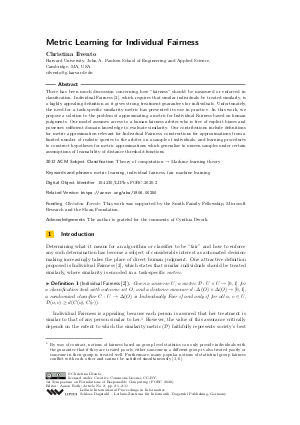Metric Learning for Individual Fairness
Author Christina Ilvento
-
Part of:
Volume:
1st Symposium on Foundations of Responsible Computing (FORC 2020)
Part of: Series: Leibniz International Proceedings in Informatics (LIPIcs)
Part of: Conference: Symposium on Foundations of Responsible Computing (FORC) - License:
 Creative Commons Attribution 3.0 Unported license
Creative Commons Attribution 3.0 Unported license
- Publication Date: 2020-05-18
File

PDF
LIPIcs.FORC.2020.2.pdf
- Filesize: 0.66 MB
- 11 pages
Document Identifiers
Related Versions
Subject Classification
ACM Subject Classification
- Theory of computation → Machine learning theory
Keywords
- metric learning
- individual fairness
- fair machine learning
Metrics
- Access Statistics
-
Total Accesses (updated on a weekly basis)
0Document
0Metadata
Abstract
There has been much discussion concerning how "fairness" should be measured or enforced in classification. Individual Fairness [Dwork et al., 2012], which requires that similar individuals be treated similarly, is a highly appealing definition as it gives strong treatment guarantees for individuals. Unfortunately, the need for a task-specific similarity metric has prevented its use in practice. In this work, we propose a solution to the problem of approximating a metric for Individual Fairness based on human judgments. Our model assumes access to a human fairness arbiter who is free of explicit biases and possesses sufficient domain knowledge to evaluate similarity. Our contributions include definitions for metric approximation relevant for Individual Fairness, constructions for approximations from a limited number of realistic queries to the arbiter on a sample of individuals, and learning procedures to construct hypotheses for metric approximations which generalize to unseen samples under certain assumptions of learnability of distance threshold functions.
Cite As Get BibTex
Christina Ilvento. Metric Learning for Individual Fairness. In 1st Symposium on Foundations of Responsible Computing (FORC 2020). Leibniz International Proceedings in Informatics (LIPIcs), Volume 156, pp. 2:1-2:11, Schloss Dagstuhl – Leibniz-Zentrum für Informatik (2020)
https://doi.org/10.4230/LIPIcs.FORC.2020.2
BibTex
@InProceedings{ilvento:LIPIcs.FORC.2020.2,
author = {Ilvento, Christina},
title = {{Metric Learning for Individual Fairness}},
booktitle = {1st Symposium on Foundations of Responsible Computing (FORC 2020)},
pages = {2:1--2:11},
series = {Leibniz International Proceedings in Informatics (LIPIcs)},
ISBN = {978-3-95977-142-9},
ISSN = {1868-8969},
year = {2020},
volume = {156},
editor = {Roth, Aaron},
publisher = {Schloss Dagstuhl -- Leibniz-Zentrum f{\"u}r Informatik},
address = {Dagstuhl, Germany},
URL = {https://drops.dagstuhl.de/entities/document/10.4230/LIPIcs.FORC.2020.2},
URN = {urn:nbn:de:0030-drops-120183},
doi = {10.4230/LIPIcs.FORC.2020.2},
annote = {Keywords: metric learning, individual fairness, fair machine learning}
}
Author Details
Funding
- Ilvento, Christina: This work was supported by the Smith Family Fellowship, Microsoft Research and the Sloan Foundation.
Acknowledgements
The author is grateful for the comments of Cynthia Dwork.
References
-
Alexandra Chouldechova. Fair prediction with disparate impact: A study of bias in recidivism prediction instruments. Big Data, 5(2):153-163, 2017.

-
Cynthia Dwork, Moritz Hardt, Toniann Pitassi, Omer Reingold, and Richard Zemel. Fairness through awareness. In Proceedings of the 3rd innovations in theoretical computer science conference, pages 214-226. ACM, 2012.

-
Stephen Gillen, Christopher Jung, Michael J. Kearns, and Aaron Roth. Online learning with an unknown fairness metric. In Samy Bengio, Hanna M. Wallach, Hugo Larochelle, Kristen Grauman, Nicolò Cesa-Bianchi, and Roman Garnett, editors, Advances in Neural Information Processing Systems 31: Annual Conference on Neural Information Processing Systems 2018, NeurIPS 2018, 3-8 December 2018, Montréal, Canada, pages 2605-2614, 2018.

- Christina Ilvento. Metric learning for individual fairness. CoRR, abs/1906.00250, 2019. URL: http://arxiv.org/abs/1906.00250.
-
Michael P. Kim, Omer Reingold, and Guy N. Rothblum. Fairness through computationally-bounded awareness. In Advances in Neural Information Processing Systems 31: Annual Conference on Neural Information Processing Systems 2018, NeurIPS 2018, 3-8 December 2018, Montréal, Canada, pages 4847-4857, 2018.

-
Jon M. Kleinberg, Sendhil Mullainathan, and Manish Raghavan. Inherent trade-offs in the fair determination of risk scores. In 8th Innovations in Theoretical Computer Science Conference, ITCS 2017, January 9-11, 2017, Berkeley, CA, USA, pages 43:1-43:23, 2017.

-
Leslie G Valiant. A theory of the learnable. In Proceedings of the sixteenth annual ACM symposium on Theory of computing, pages 436-445. ACM, 1984.

-
Laurens Van Der Maaten and Kilian Weinberger. Stochastic triplet embedding. In Machine Learning for Signal Processing (MLSP), 2012 IEEE International Workshop on, pages 1-6. IEEE, 2012.

-
Michael J Wilber, Iljung S Kwak, and Serge J Belongie. Cost-effective hits for relative similarity comparisons. In Second AAAI Conference on Human Computation and Crowdsourcing, 2014.

-
Gal Yona and Guy N. Rothblum. Probably approximately metric-fair learning. In Proceedings of the 35th International Conference on Machine Learning, ICML 2018, Stockholmsmässan, Stockholm, Sweden, July 10-15, 2018, pages 5666-5674, 2018.

